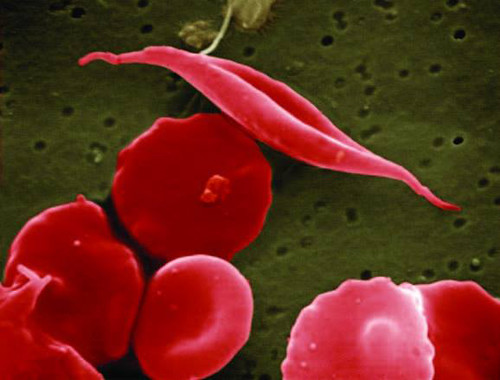UC launches gene therapy trial to transform the treatment of sickle cell disease
By Lisa M. Krieger,
The Mercury News
| 03. 31. 2021
CRISPR gene editing corrects the defect that causes blood disease
"Sickle cell disease (SCD)" by National Institutes
of Health (NIH) is licensed under CC BY-NC 2.0
A team of University of California scientists are launching a first-ever human study of a powerful new gene-editing technique to fix the bad gene that causes sickle cell disease, offering the promise of a cure for the devastating blood illness.
On Tuesday, researchers announced that they have received U.S. Food and Drug Administration approval to test the approach, using a technique called CRISPR-Cas9, at UCSF Benioff Children’s Hospital Oakland and UCLA’s Broad Stem Cell Research Center.
“Our goal is to be able to deliver a safe and effective therapy that we can administer as soon as we know the diagnosis — and spare those children and young adults all the complications of this disorder.” said Dr. Mark Walters, a professor of pediatrics at UCSF and principal investigator of the project.
For 65 years, scientists have known the cause of sickle cell disease but have been unable to cure it without a bone marrow transplant. By fixing the underlying genetic problem, the new research buoys...
Related Articles
By Diaa Hadid and Shweta Desai, NPR | 01.29.2026
MUMBRA, India — The afternoon sun shines on the woman in a commuter-town café, highlighting her almond-shaped eyes and pale skin, a look often sought after by couples who need an egg to have a baby.
"I have good eggs,"...
By George Janes, BioNews | 01.12.2026
A heart attack patient has become the first person to be treated in a clinical trial of an experimental gene therapy, which aims to strengthen blood vessels after coronary bypass surgery.
Coronary artery bypass surgery is performed to treat...
By Staff, ScienceDaily | 01.05.2026
Scientists at UNSW Sydney have developed a new form of CRISPR technology that could make gene therapy safer while also resolving a decades-long debate about how genes are switched off. The research shows that small chemical markers attached to DNA
...
Following a long-standing CGS tradition, we present a selection of our favorite Biopolitical Times posts of the past year.
In 2025, we published up to four posts every month, written by 12 authors (staff, consultants and allies), some in collaboration and one simply credited to CGS.
These titles are presented in chronological order, except for three In Memoriam notices, which follow. Many more posts that are worth your time can be found in the archive. Scroll down and “VIEW...




